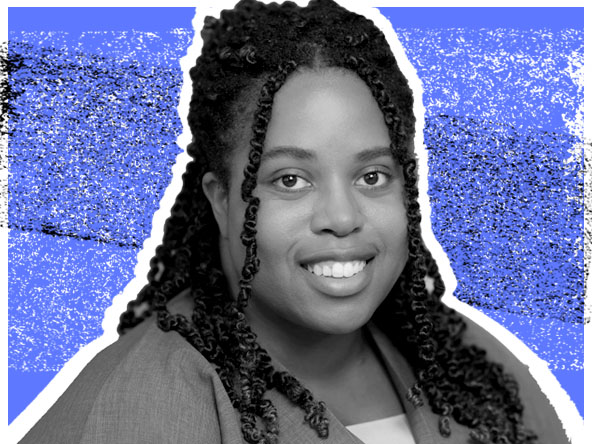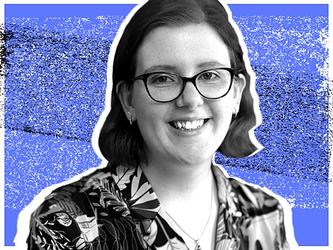Next generation chat with LaShanda Seaman: ‘Take the opportunities’

What does your average day look like?
There’s no average day in this world, and as I have progressed in my career, my days can be split between being out in the field doing fieldwork, the comfort of working at home and doing analysis, and report writing. I think that suits my personality – some people think I’m an extrovert, but I’m really not. I really enjoy that balance of being out with people but also having that quiet time as well.
How do you achieve work-life balance?
I think being a qually, you expect there to be peaks and valleys at different times of the year. Sometimes it is really full-on where you have more intense fieldwork, but that’s when you need a really good team where you can spread things out and know that you all go through a busy time together – it is not all on you.
I think most organisations have good systems in place where you can take time back in some way, which is really good but don’t feel guilty about it – take the time back, it’s really important. You can then still do what you need to do in your day-to-day life and not get burnt out. It is easy to put your hand up to do stuff, but if you don’t take care of yourself, that’s where the burnout comes in.
I had a project last summer where we had four or five weekends in a row where we doing workshops. I was nudging more junior colleagues to not just take it [time back in lieu] but asking ‘have you taken it, have you put it in your calendar?’ so that they felt comfortable to set aside time to do it. I know I’m a good example to them if I say ‘I’m taking the time back’, and they know it is ok to do so as well. Sometimes they feel like they’re the only ones doing it [taking time off] and everyone else is ploughing ahead and not taking any leave. They feel they need to do the same thing and that’s not the case.
What three words would you use to describe yourself?
I think I am a really curious person – I’ve always been really curious about different topics, different communities. As a qually, being creative as well – I think that comes out in designing different materials and workshops, and the different interests I have outside of work. I think also just being resilient – wanting to keep on going no matter what is going on, whether in work or personal.
What would you tell your younger self?
I think if I was my younger self coming in now, especially working from home, [my advice] is to take the opportunities. Doing those presentations for clients, doing those internal presentations as well – taking those opportunities to raise your profile and have more visibility is really important. You should want to try new things as well – if someone has said ‘you’ve never worked in this type of project before’, dip your toes into it so you don’t feel you’re being pigeonholed into something so early in your career.
That’s even more important because of the fact we have hybrid working – it is very easy to get into the routine of working with the same people and no-one else really knowing about you. Talk to people – set up coffee meetings, things like that.
Is there any advice for younger researchers to develop in their roles when working from home?
I come from the perspective where I have always worked from home for part of the time. I think it is making the most of your time in the office.
When in the office, don’t just have your head down and not talk to anybody – talk to people, have those face-to-face meetings. There’s nothing worse than going into the office and being on Teams or Zoom all day – make those meeting face-to-face so you’re building a rapport with people. Maybe go out for lunch with somebody. There’s definitely a different set of skills young researchers need in the hybrid world.
How do you feel about AI’s role in research?
I think, for me, AI is a companion. It is a support – it is not the enemy. I know that it is not going to replace our role as researchers. The human is still very much needed. We use AI every day in a lot of our tasks, but I think it is important for people to understand the limitations of it. Experiment with it, have some fun – but I think it is still really important to know the limitations and where you add some value.
Is the sector at a turning point?
We are more at a bend in the curve of a winding road. It is another set of obstacles we are facing, in terms of the economy changing and a lot of new technology coming out, and how we deal with all of these challenges. I don’t think it is anything we can’t overcome, but it is how we overcome it and what we put in place.
For AI, how do we implement it properly and safely so it benefits our industry and we’re not behind? How do we support junior researchers when it comes to coming into this hybrid world rather than saying they should get into the office for five days and no one else is there? How do we continue to evolve and not be on the back foot? I would love to see our industry be more innovative and on the front foot compared with some of the other industries out there.
What would you tell younger researchers entering the industry?
We are a friendly industry, so I would say there are always people who are up for a chat. Send some messages on LinkedIn and someone will happily jump on a call with you for 10 or 15 minutes and talk to you about their job and nuances of the industry. There’s always events going on. Build relationships with people.
What advice would you give to researchers at later stages of their careers?
I think for senior colleagues, I would say do whatever you can to support the drive and enthusiasm of younger researchers. We all know what it is like to be younger, to have that buzz, that energy, the ideas and doing lots of different things, and the adults pour water on them. They want to go to different initiatives or you’re directing them to &more, where they can meet other young researchers and know more about the industry. Help them to understand more about their career arc, so it doesn’t just feel like a job and help them to feel like they actually belong in the market research industry.

We hope you enjoyed this article.
Research Live is published by MRS.
The Market Research Society (MRS) exists to promote and protect the research sector, showcasing how research delivers impact for businesses and government.
Members of MRS enjoy many benefits including tailoured policy guidance, discounts on training and conferences, and access to member-only content.
For example, there's an archive of winning case studies from over a decade of MRS Awards.
Find out more about the benefits of joining MRS here.












0 Comments